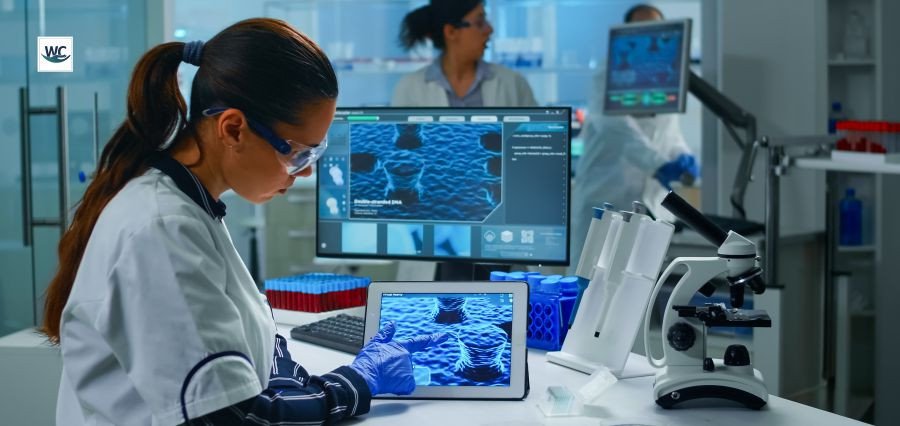- December 18, 2025

In 2025, genetics,
biotechnology, digital health, and personalized medicine are revolutionizing
diagnosis, treatment, and even prevention of disease. These developments are no
longer on the drawing board — they are already reshaping clinical practice,
public health policy, and patient health worldwide. The greatest life science
developments revolutionizing health care in 2025 are outlined below.
1. CRISPR 3.0 and the
Arrival of Gene-Editing Therapies
CRISPR technology has
progressed a great distance since its discovery, and in 2025, CRISPR 3.0 is
making precise, safe, and scalable gene editing a reality. CRISPR 3.0, unlike
earlier iterations, has reduced off-target effects, improved delivery systems,
and multi-gene editing. All of these technologies allow scientists to edit
complex genetic diseases such as cystic fibrosis, sickle cell anemia, and
certain cancers with unprecedented precision. Gene-editing trials already are
starting to deliver on curing inherited blindness and muscular dystrophy,
paving the way for regular genetic treatments in the not-too-distant future.
2. AI-Driven Drug
Discovery
Quantum computers and
deep learning algorithms now enable platforms to predict the behavior of
molecules, screen for drug candidates, and model humans' reactions at much
higher speeds than humans themselves could possibly achieve. By 2025, AI-driven
tools will reduce early-stage drug discovery times by 40–60%, saving time and
bringing treatments to patients earlier. Coincidentally, several of the cancer
immunotherapies and orphan drugs that made it to clinical trials this year were
co-discovered using AI algorithms, demonstrating the promise of human-machine
collaboration.
3. mRNA Technology After
COVID-19
Global success with
mRNA COVID-19 vaccines brought on vaccinology's new era. Moderna and BioNTech
are leading the development of individualized mRNA cancer vaccines from a
patient's tumor genetics. mRNA vaccines for melanoma, pancreatic cancer, and
multiple sclerosis are demonstrating encouraging results in human trials,
potentially transforming fatal diseases into chronic or curable conditions.
4. Wearable and
Implantable Biosensors
Medical care has moved
from the clinic to the wrist — and even under the skin. In 2025, implantable
and wearable biosensors track glucose, heart rate, hydration, blood oxygen
saturation, and even brain waves in real-time. Flexible electronics-led new
biosensors, fueled by kinetic energy or body heat, now make continuous and
non-invasive biomarker tracking possible. These sensors are critical in the
management of chronic diseases like diabetes and heart failure, enabling
predictive medicine and reduced hospitalizations.
5. Digital Twins in
Precision Medicine
One of the most
exciting concepts to take hold in 2025 is the creation of digital twins —
computer simulations of a person's organs, genes, and physiological networks.
Digital twins allow doctors to forecast responses to treatment, model drug
interactions, and model disease progression without touching the patient.
Digital twins are particularly important in cardiology, cancer, and neurology,
allowing for a new degree of personalized treatment and risk assessment.
6. Regenerative
Medicine and 3D Bioprinting
Regenerative medicine
has progressed significantly, and 3D bioprinting now prints complex tissues and
organ frameworks. Whole-organ printing is under development, but functional
bioprinted skin, cartilage, and vascular tissues are now being implanted in
clinics in 2025. Stem-cell-filled scaffolds are repairing damaged heart and
nerve tissue, bringing new hope for patients with stroke or spinal trauma. The
technology is moving towards personalized organ patches and eventually fully
transplanted organs.
7. Brain-Computer
Interfaces (BCIs) and Neurotechnology
Neurotech has gone
mainstream in 2025 with brain-computer interfaces (BCIs) becoming part of
medical use, such as restoring mobility to paralyzed patients, treating severe
depression, and allowing patients with locked-in syndrome to communicate.
Neuralink and Synchron are two of the companies that have created minimally
invasive implants that can decode neural activity into digital commands,
essentially connecting biology to machines. Other than restoring lost functions,
the devices are also enabling cognitive enhancement therapies.
8. Microbiome-Based
Therapies
Once considered the
"forgotten organ," the human microbiome is now front and center in
numerous treatment modalities. In 2025, microbiome therapy is employed to treat
gastrointestinal disease, mood disorders, and even metabolic syndrome ailments
like obesity and Type 2 diabetes. Fecal microbiota transplantation (FMT) has
been revolutionized into precision microbiome modulation, wherein a specific
bacterial strain is cultured and administered to restore balance to the gut
microbiota for wellness.
9. Next-Generation
Telemedicine and Virtual Care
As telemedicine
exploded during the pandemic of COVID-19, it has progressed to 2025 with the
addition of AI, AR/VR, and remote diagnostic equipment. Patients now have
virtual physicals through haptic devices, utilize AI-based symptom checkers,
and have consultation with experts from around the world in virtual reality. It
is especially revolutionary for rural and underprivileged communities, allowing
high-level medical care to reach them more easily.
10. Science of
Longevity and Anti-Aging Therapies
Aging is no longer
viewed as an inexorable decline, but a reversible state. By 2025, longevity
biotechs are working on senolytics — medicines that attack and kill aging cells
— and gene therapies that boost DNA repair and mitochondrial function.
Therapies like NAD+ boosters, telomere lengthening methods, and reprogramming
of cells are already exhibiting early results in delaying age-related disease
and expanding health span, not merely lifespan.
Conclusion
Life science innovation is revolutionizing the healthcare of the future in 2025. Gene editing and organ printing, to the capability of digitally recreating entire bodies, science is not just curing disease but redefining the very concept of health. All this is taking us to a future where medicine is predictive, personalized, and proactive — with extended, healthier, and more meaningful lives for all. As these technologies evolve, ethical considerations, access to all, and patient empowerment will be the determinants of their success and longevity.
Author
Kevin Smith